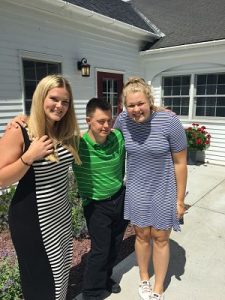Pathfinder Village was founded as the first and only community established specifically for individuals with Down syndrome. The mission of Pathfinder Village is to promote a healthy, progressive environment that respects each individual, supporting a life of value and independence for children and adults with Down syndrome and related developmental disabilities. Recognizing the gifts, talents and abilities of each person they support, the Pathfinder Village community enables individuals with disabilities and their families to envision and to create a “life with meaning.” This includes friendships, independence, community involvement, and the freedom to pursue individual interests and life goals. Read more
Latest Posts
Jessica Eldridge ’19 researches ways to increase retention rates at Pathfinder Village
By Upstate Institute on October 30, 2017Zakaria Chakrani ’18 builds website for Abraham House, enhancing donation potential
By Upstate Institute on September 16, 2017This summer I had the opportunity to intern with the Abraham House in Utica, New York. The organization’s mission is to offer the terminally ill a secure and loving home, free of charge, while providing them physical, emotional, and spiritual support. The Abraham House partners with Hospice and Palliative Care, Inc. to provide their guests a variety of services, including oversight, comprehensive medical care plans, social workers, and bereavement services. The organization continually strives to provide both compassion and the comfort of a surrogate family to every individual in their care, as well as their families.
Two student research projects receive funding
By Upstate Institute on February 1, 2017The Upstate Institute is funding two student research projects this spring through the Student Research Funding program. This program enables students engaged in research that is of a high quality and benefits or informs the Upstate community in some way to apply for funding to cover the directs costs of the research project. Research projects funded by the Upstate Institute must be conducted within a department or interdisciplinary program, and sponsored by a faculty member in the sponsoring department or program. This funding will normally be used to support research during a student’s senior year (as part of a senior thesis or honors project), and can be used for any costs associated with the project.
Upstate Research Symposium features faculty and student work
By Upstate Institute on April 1, 2012The Upstate Institute hosted a series of presentations by several faculty members who have conducted projects funded by the Upstate Institute Faculty Research Program at the Colgate Bookstore on March 31. The Upstate Institute encourages faculty scholarship on or pertaining to the Upstate region by providing for the costs of research. Faculty submit proposals each January for research on topics related to the broad region of upstate New York. Read more
Dara Seidl ’10: The Dirt on Worms: Knowledge, Attitudes and Behaviors Concerning Invasive Earthworms in the Town of Webb, NY
By Upstate Institute on July 1, 2010Submitted to the Department of Geography for Honors
The invasion of exotic earthworms in previously earthworm-free areas eliminates the forest litter layer, alters the carbon and nitrogen cycles and reduces native plant cover. Humans are the principal agents of invasive earthworm dispersal, spreading worms both inadvertently through the horticulture industry, logging and road travel, and voluntarily through composting and the disposal of earthworm bait on land. Read more
Leighann Kimber ’10:New Immigrant Settlement Patterns in Syracuse, NY: An Assessment of the Model of Heterolocalism
By Upstate Institute on July 1, 2010Submitted to the Department of Geography for Honors
The 1965 Immigration and Nationality Act profoundly altered the typical demographic characteristics of immigrants entering the United States. With an increasing overall skill level among immigrants entering since 1965, the settlement patterns of immigrants have begun to diverge from the urban ethnic enclave which is reminiscent of pre-1965 eras of immigration. Read more
Ben Taylor ’10: Small Farms and Sustainability: A Case Study in Madison County, New York
By Upstate Institute on July 1, 2010Submitted to the Department of Geography for Honors
Small farms in the United States have undergone many significant changes throughout history. Today, small farm agricultural systems are being proposed as a more sustainable form of agriculture. This paper defines sustainability in the context of agriculture, and then examines how it is being embraced by small farm owners. Read more
Student wins research award from Botanical Society
By Upstate Institute on January 14, 2010Wes Testo ’12 has won a prestigious award from the Botanical Society of America for his research of a rare species of fern protected under the Endangered Species Act.
Testo presented a poster at the society’s annual conference held recently in Providence, RI. Also presenting a poster about fern research was Michael Britton ’12. Read more
Sarah Halpern ’08: Caring for their Own: Jewish Community of Rochester 1920-1945 and the Development of New American Jewish Identity
By Upstate Institute on July 1, 2008Submitted to the Department of History
Nestled along Erie Canal in upstate New York, Rochester hosted the second largest Jewish population in the state of New York by 1940 with over 30,000 Jews. Halpern’s paper explores this community in two ways. Read more
Darcy Richardson ’06: Child-Only Welfare Cases in Madison County
By Upstate Institute on July 1, 2006Ever since the welfare reform of the late 1990’s, greater attention has been paid to child-only welfare households. These are the households in which only the children are eligible to receive TANF funding, due the SSI or immigrant status of their parents or because they are living with non-parent relative caregivers. Read more





